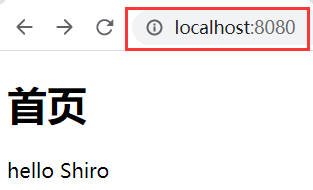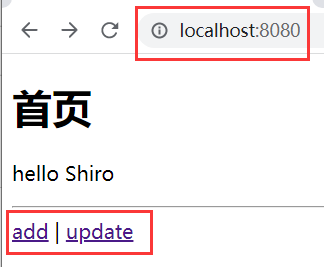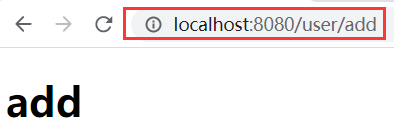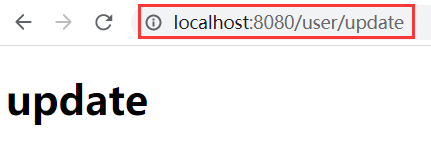springboot-shiro:搭建测试环境
1 创建一个springboot项目
创建过程中添加web模块
2 导入thymeleaf依赖
pom.xml
<!--thymeleaf模板引擎--> <dependency> <groupId>org.thymeleaf</groupId> <artifactId>thymeleaf-spring5</artifactId> </dependency> <dependency> <groupId>org.thymeleaf.extras</groupId> <artifactId>thymeleaf-extras-java8time</artifactId> </dependency>
3 编写主页
src/main/resources/templates/index.html
<!DOCTYPE html> <html lang="en"> <head> <meta charset="UTF-8"> <title>Title</title> </head> <body> <h1>首页</h1> <p th:text="${msg}"></p> </body> </html>
4 创建一个controller包,在该包下编写一个MyController
src/main/java/com/lv/controller/MyController.java
package com.lv.controller; import org.springframework.stereotype.Controller; import org.springframework.ui.Model; import org.springframework.web.bind.annotation.RequestMapping; @Controller public class MyController { @RequestMapping({"/","/index"}) public String toIndex(Model model){ model.addAttribute("msg","hello Shiro"); return "index"; } }
5 启动项目,访问首页

首页访问成功后,就可以进行接下来的操作
6 导入shiro和spring整合的依赖
<!--shiro整合spring的包--> <dependency> <groupId>org.apache.shiro</groupId> <artifactId>shiro-spring</artifactId> <version>1.8.0</version> </dependency>
7 创建一个config包,在该包下编写一个自定义的realm的类
在这个realm类中可以编写一些查询的方法,或者认证与授权的逻辑
src/main/java/com/lv/config/UserRealm.java
package com.lv.config; import org.apache.shiro.authc.AuthenticationException; import org.apache.shiro.authc.AuthenticationInfo; import org.apache.shiro.authc.AuthenticationToken; import org.apache.shiro.authz.AuthorizationInfo; import org.apache.shiro.realm.AuthorizingRealm; import org.apache.shiro.subject.PrincipalCollection; //自定义的UserRealm extends AuthorizingRealm public class UserRealm extends AuthorizingRealm { //授权 @Override protected AuthorizationInfo doGetAuthorizationInfo(PrincipalCollection principalCollection) { System.out.println("执行了=>授权doGetAuthorizationInfo"); return null; } //认证 @Override protected AuthenticationInfo doGetAuthenticationInfo(AuthenticationToken authenticationToken) throws AuthenticationException { System.out.println("执行了=>认证doGetAuthorizationInfo"); return null; } }
8 在config包下编写一个shiro配置类
需要在这个配置类中配置三个核心API:
- Subject 用户
- SecurityManger 管理所有用户
- Realm 连接数据
src/main/java/com/lv/config/ShiroConfig.java
package com.lv.config; import org.apache.shiro.spring.web.ShiroFilterFactoryBean; import org.apache.shiro.web.mgt.DefaultWebSecurityManager; import org.springframework.beans.factory.annotation.Qualifier; import org.springframework.context.annotation.Bean; import org.springframework.context.annotation.Configuration; //声明为配置类 @Configuration public class ShiroConfig { //ShiroFilterFactoryBean : 第三步 @Bean public ShiroFilterFactoryBean getShiroFilterFactoryBean(@Qualifier("securityManager") DefaultWebSecurityManager defaultWebSecurityManager){ ShiroFilterFactoryBean bean = new ShiroFilterFactoryBean(); //设置安全管理器 bean.setSecurityManager(defaultWebSecurityManager); return bean; } //DefaultWebSecurityManager : 第二步 @Bean(name = "securityManager") public DefaultWebSecurityManager getDefaultWebSecurityManager(@Qualifier("userRealm") UserRealm userRealm){ DefaultWebSecurityManager securityManager = new DefaultWebSecurityManager(); //关联userRealm securityManager.setRealm(userRealm); return securityManager; } //创建realm对象,需要自定义类 : 第一步 @Bean public UserRealm userRealm(){ return new UserRealm(); } }
9 创建两个页面
在templates下新建一个user目录 并在该目录下编写add.html和update.html
src/main/resources/templates/user/add.html
<!DOCTYPE html> <html lang="en"> <head> <meta charset="UTF-8"> <title>Title</title> </head> <body> <h1>add</h1> </body> </html>
src/main/resources/templates/user/update.html
<!DOCTYPE html> <html lang="en"> <head> <meta charset="UTF-8"> <title>Title</title> </head> <body> <h1>update</h1> </body> </html>
10 在controller中添加跳转页面的方法
src/main/java/com/lv/controller/MyController.java
@RequestMapping("/user/add") public String add(){ return "user/add"; } @RequestMapping("/user/update") public String update(){ return "user/update"; }
11 在首页,增加跳转链接
src/main/resources/templates/index.html
<body> <h1>首页</h1> <p th:text="${msg}"></p> <hr> <a th:href="@{/user/add}">add</a> | <a th:href="@{/user/update}">update</a> </body>
12 重启项目,测试
访问首页

点击add链接

点击update链接

页面跳转成功
分类:
springboot-study



· 阿里巴巴 QwQ-32B真的超越了 DeepSeek R-1吗?
· 10年+ .NET Coder 心语 ── 封装的思维:从隐藏、稳定开始理解其本质意义
· 【设计模式】告别冗长if-else语句:使用策略模式优化代码结构
· 字符编码:从基础到乱码解决
· 提示词工程——AI应用必不可少的技术